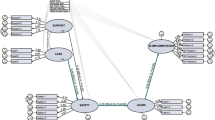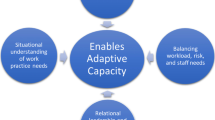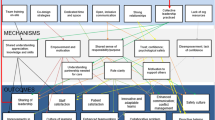Abstract
Purpose
Researchers have identified team learning as an important predictor of team performance. In healthcare organizations, it is especially critical for care quality and hospital performance that teams engage in learning behaviors to reduce errors and improve service effectiveness. The main objective of this study is to examine the role of change-oriented leadership in the learning process and outcomes of healthcare teams.
Design/Methodology/Approach
The sample comprises a total of 698 healthcare professionals working in 107 teams at different public hospitals throughout Spain. Members of teams were invited to participate voluntarily by completing an anonymous individual questionnaire.
Findings
The results show a mediating effect of team learning on the relationship between change-oriented leadership and team performance and psychological safety and team performance.
Originality/Value
Our study contributes to the literature by investigating the role of change-oriented leadership in facilitating team learning behaviors. Moreover, this study advances our understanding of the mediators of the relationship between team leadership and outcomes by testing to assess whether specific change-oriented leader behaviors nurture psychological safety, team learning and, therefore, performance.


Similar content being viewed by others
References
Ancona, D. G., & Caldwell, D. F. (1992). Demography and design: Predictors of new product team performance. Organization Science, 3, 321–341.
Argote, L., Gruenfeld, D., & Naquin, C. (2001). Group learning in organizations. In M. E. Turner (Ed.), Groups at work: Advances in theory and research (pp. 369–411). Mahwah: Lawrence Eribaum.
Baron, R. M., & Kenny, D. A. (1986). The moderator–mediator variable distinction in social psychological research: Conceptual, strategic and statistical considerations. Journal of Personality and Social Psychology, 51, 1173–1182.
Bass, B. M. (1985). Leadership and performance beyond expectations. New York: Free Press.
Bass, B. M., Avolio, B. J., Jung, D. I., & Berson, Y. (2003). Predicting unit performance by assessing transformational and transactional leadership. Journal of Applied Psychology, 88, 207–218.
Berta, W. B., & Baker, R. (2004). Factors that impact the transfer and retention of best practices for reducing error in hospitals. Healthcare Management Review, 29(2), 90–97.
Bliese, P. D. (2000). Within-group agreement, non independence, and reliability: Implications for data aggregation and analysis. In K. Klein & S. W. Kozlowski (Eds.), Multilevel theory, research, and method in organizations (pp. 349–381). San Francisco: Jossey-Bass.
Bresman, H. (2010). External learning activities and team performance. A multimethod field study. Organization Science, 1, 81–96.
Brueller, D., & Carmeli, A. (2011). Linking capacities of high-quality relationships to team learning and performance in service organizations. Human Resource Management, 50, 455–477.
Bunderson, J. S., & Sutcliffe, K. M. (2003). Management team learning orientation and business unit performance. Journal of Applied Psychology, 88(3), 552–560.
Burke, C. S., Stagl, K. C., Klein, C., Goodwin, G. F., Salas, E., & Halpin, S. M. (2006). What type of leadership behaviors are functional in teams? A meta-analysis. The Leadership Quarterly, 17, 288–307.
Burns, J. M. (1978). Leadership. New York: Harper & Row.
Cannon, M. D., & Edmondson, A. C. (2001). Confronting failure: Antecedents and consequences of shared beliefs about failure in organizational work groups. Journal of Organizational Behavior, 22, 161–177.
Carmeli, A., Brueller, D., & Dutton, J. E. (2009). Learning behaviours in the work place: The role of high-quality interpersonal relationships and psychological safety. System Research and Behavioral Science, 26, 81–98.
Chan, D. (1998). Functional relations among constructs in the same content domain at different levels of analysis: A typology of composition models. Journal of Applied Psychology, 83, 234–246.
Chan, C. C. A., Pearson, C., & Entrekin, L. (2003). Examining the effects of internal and external team learning on performance. Team Performance Management, 9, 174–181.
Day, D. V., Gronn, P., & Salas, E. (2004). Leadership capacity in teams. The Leadership Quarterly, 15, 857–880.
Detert, J. R., & Burris, E. R. (2007). Leadership behavior and employee voice: Is the door really open? Academy of Management Journal, 50, 869–884.
Edmondson, A. C. (1996). Learning from mistakes is easier said than done: Group and organizational influences on the detection and correction of human error. The Journal of Applied Behavioral Science, 32, 5–28.
Edmondson, A. C. (1999). Psychological safety and learning behaviors in work teams. Administrative Science Quarterly, 44, 350–383.
Edmondson, A. C. (2002). The local and variegated nature of learning in organizations: A group-level perspective. Organization Science, 13, 128–146.
Edmondson, A. C. (2003a). Managing the risk of learning. In M. A. West, D. Tjosvold, & K. G. Smith (Eds.), International handbook of organizational teamwork and cooperative working (pp. 255–275). Chichester: Wiley.
Edmondson, A. C. (2003b). Speaking up in operating room: How team leaders promote learning in interdisciplinary action teams. Journal of Management Studies, 40, 1419–1452.
Edmondson, A. C., Bohmer, R. M., & Pisano, G. (2001). Speeding up team learning. Harvard Business Review, 79(9), 125–132.
Edmondson, A. C., Dillon, J. R., & Roloff, K. (2007). Three perspectives on team learning: Outcome improvement, task mastery, and group process. In J. P. Walsh & A. P. Brief (Eds.), The academy of management annals (pp. 269–314). Hillsdale, NJ: Psychology Press.
Edmondson, A. C., & Roloff, K. S. (2009). Overcoming barriers to collaboration: Psychological safety and learning in diverse teams. In E. Salas, G. F. Goodwin, & C. S. Burke (Eds.), Team effectiveness in complex organizations: Cross-disciplinary perspectives and approaches (Vol. 34, pp. 183–208). New York: Routledge/Taylor & Francis Group.
Edmondson, A., & Woolley, A. (2003). Understanding outcomes of organizational learning interventions. In M. Easterby-Smith & M. Lyles (Eds.), International handbook on organizational learning and knowledge management (pp. 185–211). London: Blackwell.
Ellis, A. P. J., Hollenbeck, J. R., Illgen, D. R., Porter, C. O. L. H., West, B. J., & Moon, H. (2003). Team learning: Collectively connecting the dots. Journal of Applied Psychology, 88, 821–835.
Gibson, C. B., & Vermeulen, F. (2003). A healthy divide: Subgroups as a stimulus for team learning behavior. Administrative Science Quarterly, 48, 202–239.
Gil, F., Rico, R., Alcover, C. M., & Barrasa, A. (2005). Change-oriented leadership, satisfaction and performance in work groups: Effects of team climate and group potency. Journal of Managerial Psychology, 20, 312–328.
Gilmartin, M., & D′Aunno, T. A. (2007). Leadership research in healthcare. The Academy of Management Annals, 1(1), 387–438.
Hayes, A. F. (2009). Beyond Baron and Kenny: Statistical mediation in the new millennium. Communication Monographs, 76(4), 408–420.
Hayes, A. F. (2012). PROCESS: A versatile computational tool for observed variable mediation, moderation, and conditional process modeling [White paper]. Retrieved June 11, 2013 from http://www.afhayes.com/public/process2012.pdf.
Hirst, G., Van knippenberg, D., & Zhou, J. (2009). A cross-level perspective of employee creativity: Goal orientation, team learning behavior and, individual creativity. Academy of Management Journal, 52, 280–293.
Institute of Medicine. (1999). To err is human: Building a safer health system . Washington, DC: Institute of Medicine.
James, L. R., Demaree, R. G., & Wolf, G. (1984). Estimating within-group interrater reliability with and without response bias. Journal of Applied Psychology, 69(1), 85–98.
Jehn, K. A., & Rupert, J. (2008). Group faultlines and team learning: How to benefit from different perspectives. In V. I. Sessa & M. London (Eds.), Group work learning (pp. 119–147). New York: Lawrence Erlbaum.
Kozlowski, S. W. J., & Ilgen, D. R. (2006). Enhancing the effectiveness of work groups and teams. Psychological Science in the Public Interest, 7(3), 77–124.
Künzle, B., Kolbe, M., & Grote, G. (2010). Ensuring patient safety through effective leadership behaviour: A literature review. Safety Science, 48, 1–17.
Lemieux-Charles, L., & McGuire, W. L. (2006). What do we know about healthcare team effectiveness? A review of the literature. Medical Care Research and Review, 63, 263–300.
Lim, B. C., & Ployhart, R. E. (2004). Transformational leadership: Relations to the five factor model and team performance in typical and maximum contexts. Journal of Applied Psychology, 89, 610–621.
MacKinnon, D. P., Coxe, S., & Baraldi, A. N. (2012). Guidelines for the investigation of mediating variables in business research. Journal of Business and Psychology, 27, 1–14.
Mathieu, J., Maynard, M. T., Rapp, T., & Gilson, L. (2008). Team effectiveness 1997–2007: A review of recent advancements and a glimpse into the future. Journal of Management, 34(3), 410–476.
McAlearney, A. S. (2006). Leadership development in healthcare: A qualitative study. Journal of Organizational Behavior, 27, 967–982.
Nembhard, I. M., & Edmondson, A. C. (2006). Making it safe: The effects of leader inclusiveness and professional status on psychological safety and improvement efforts in health care teams. Journal of Organizational Behavior, 27(7), 941–966.
Ortega, A., Sánchez-Manzanares, M., Gil, F., & Rico, R. (2010). Team learning and effectiveness in virtual project teams: The role of beliefs about interpersonal context. The Spanish Journal of Psychology, 13, 266–275.
Podsakoff, P. M., MacKenzie, S. B., Lee, J. Y., & Podsakoff, N. P. (2003). Common method biases in behavioral research: A critical review of the literature and recommended remedies. Journal of Applied Psychology, 88, 879–903.
Poulton, B. C., & West, M. A. (1999). The determinants of effectiveness in primary healthcare teams. Journal of Interprofessional Care, 13, 7–18.
Preacher, K. J., & Hayes, A. F. (2004). SPSS and SAS procedures for estimating indirect effects in simple mediation models. Behavior Research Methods, Instruments, & Computers, 36, 717–731.
Robbins, B., & Davidhizar, R. (2007). Transformational leadership in healthcare today. The Healthcare Manager, 26, 234–239.
Roussin, C. J., & Webber, S. S. (2012). Impact of organizational identification and psychological safety on initial perceptions of coworker trustworthiness. Journal of Business and Psychology, 27, 317–329.
Sarin, S., & McDermott, C. (2003). The effect of team leader characteristics on learning, knowledge application, and performance on cross-functional new product development teams. Decision Sciences, 34, 707–739.
Savelsbergh, C. M. J. H., van der Heijden, B. I. J. M., & Poell, R. F. (2009). The development and empirical validation of a multidimensional measurement instrument for team learning behaviors. Small Group Research, 40, 578–607.
Sellgren, S., Ekvall, G., & Tomson, G. (2006). Leadership styles in nursing management: Preferred and perceived. Journal of Nursing Management, 14, 348–355.
Shrout, P. E., & Bolger, N. (2002). Mediation in experimental and nonexperimental studies: New procedures and recommendations. Psychological Methods, 7, 422–445.
Sobel, M. E. (1982). Asymptotic intervals for indirect effects in structural equations models. In S. Leinhart (Ed.), Sociological methodology (pp. 290–312). San Francisco: Jossey-Bass.
Tucker, A. L., Nembhard, I. M., & Edmondson, A. C. (2007). Implementing new practices: An empirical study of organizational learning in hospital intensive care units. Management Science, 53(6), 894–907.
Van den Bossche, P., Gijselaers, W. H., Segers, M., & Kirschner, P. A. (2006). Social and cognitive factors driving teamwork in collaborative learning environments. Small Group Research, 37, 490–521.
Van der Vegt, G. S., & Bunderson, J. S. (2005). Learning and performance in multidisciplinary teams: The importance of collective team identification. Academy of Management Journal, 48(3), 532–547.
Van der Vegt, G. S., Bunderson, J. S., & Kuipers, B. (2009). Why turnover in self-managing work teams: Learning, social integration and task flexibility. Journal of Management, 23, 1–23.
Van der Vegt, G. S., de Jong, S. B., Bunderson, J. S., & Molleman, E. (2010). Power asymmetry and learning in teams: The moderating role of performance feedback. Organization Science, 21(3), 347–361.
Vera, D., & Crossan, M. (2004). Strategic leadership and organizational learning. Academy of Management Review, 29, 222–240.
Walshe, K., & Shortell, S. M. (2004). When things go wrong: How health care organizations deal with major failures. Health Affairs, 23(3), 103–111.
Walumbwa, F. O., & Shaubroeck, J. (2009). Leader personality traits and employee voice behavior: Mediating roles of ethical leadership and work group psychological safety. Journal of Applied Psychology, 94, 1275–1286.
Wheelan, S. A. (2009). Group size, group development and group productivity. Small Group Research, 40, 247–262.
Wilson, J. M., Goodman, P. S., & Cronin, M. A. (2007). Group learning. Academy of Management Review, 32(4), 1041–1059.
Wong, S. (2004). Distal and local group learning: Performance trade-offs and tensions. Organization Science, 15, 645–656.
Wong, A., Tjosvold, D., & Lu, J. (2010). Leadership values and learning in china: The mediating role of psychological safety. Asian Pacific Journal of Human Resources, 48(1), 86–107.
Yukl, G. (2004). Tridimensional leadership theory: A road map for flexible, adaptive leaders. In R. J. Burke & C. Cooper (Eds.), Leading in turbulent times (pp. 75–91). Oxford: Blackwell.
Yukl, G. (2009). Leading organizational learning: Reflections on theory and research. The Leadership Quarterly, 20, 49–53.
Yukl, G., Gordon, A., & Taber, T. (2002). A hierarchical taxonomy of leadership behavior: Integrating a half century of behavior research. Journal of Leadership and Organizational Studies, 9, 15–32.
Yukl, G., Wall, S., & Lepsinger, R. (1990). Preliminary report of validation of the managerial practices survey. In K. E. Clark & M. B. Clarck (Eds.), Measures of leadership (pp. 223–237). Greensboro: CCL.
Zaccaro, S. J., Ely, K., & Shuffler, M. (2008). The leader’s role in group learning. In V. I. Sessa & M. London (Eds.), Group work learning (193–214). New York: Lawrence Erlbaum.
Zellmer-Bruhn, M., & Gibson, C. (2006). Multinational organization context: Implications for team learning and performance. Academy of Management Journal, 49, 501–518.
Acknowledgments
This research was supported by FIS Instituto de Salud Carlos III, Grant No. P041981 and was partially supported by the Office of Naval Research (ONR) Collaboration and Knowledge Interoperability Program and Office of Naval Research Multidisciplinary University Research Initiative (ONR MURI) Grant No. N000140610446. The views expressed in this work are those of the authors and do not necessarily reflect the organizations with which they are affiliated, their sponsoring institutions or agencies, or their grant partners.
Author information
Authors and Affiliations
Corresponding author
Rights and permissions
About this article
Cite this article
Ortega, A., Van den Bossche, P., Sánchez-Manzanares, M. et al. The Influence of Change-Oriented Leadership and Psychological Safety on Team Learning in Healthcare Teams. J Bus Psychol 29, 311–321 (2014). https://doi.org/10.1007/s10869-013-9315-8
Published:
Issue Date:
DOI: https://doi.org/10.1007/s10869-013-9315-8




